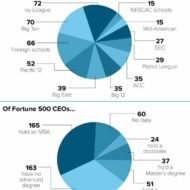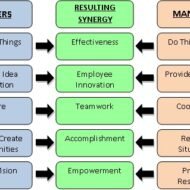Posted by Managementguru in Entrepreneurship, Human Resource, Leadership, Organisational behaviour, Principles of Management
on Mar 20th, 2014 | 0 comments

CEO – Chief Executive Officer Chief Executive Officer : The highest ranking executive in a company who is responsible for a company’s operations , usually the President or the Chairman of the Board. Chief Executive – Architect of an Organization: An architect brings out the aesthetics of a building by infusing soul into spaces through his thought process. Likewise a chief executive (CE) is the most important architect of an organization who is responsible for designing and building all aspects of strategic management right from formulation to evaluation of strategies through thought management. He has multifarious facets to exhibit and designations to be withheld, such as the managing director, executive director, president or general manager in business enterprises. As the chief strategist, he plays a pivotal role in strategic decision-making too. Due to the significance attached to the post, researchers and numerous authors have attempted to redefine their roles, functions and responsibilities from time to time. This is quite understandable since the CE of an association plays the most vital role in determining whether an organization has chosen the right path towards success. Chief Administrator: He might also be called as the organizational leader or builder; chief administrator, implementer or coordinator and communicator of organizational objectives; he should don various roles in the likes of motivator, personal leader or mentor, depending on the function he is anticipated to perform by the management. Every chief executive does not and need not personify all the above cited qualities: but a good chief with high business acumen and an eye for detail can definitely fill the bill over a period of time. Major roles and responsibilities of a chief executive: Enunciation of Corporate Philosophy -with the help of his team members the chief executive must try to set the company’s goals and objectives and supporting strategic moves must be planned from the bottom level to the top. Clues from the external environment must be taken into consideration before making the necessary moves. Growth-all the CE’s are expected to be growth stimulators. This can be accomplished by setting targets which have to be dealt with within the stipulated time period. Employees can be involved in this process to set short term objectives followed by periodical reviews with management executives to evaluate the success rate of the projects undertaken. The expertise and interest of the CE helps to infuse motivation and enthusiasm amongst the work force which results in quick completion of targets. A chief executive is responsible for both external and internal functional responsibilities. His role cannot be confined to a particular sphere of action as he is expected to be a generalist in order to manage effectively and be self sufficient once he reaches the top. Self-management and management of time are very important. Outgoing and should possess charisma Other parameters like age, intelligence, education, functional background and experience are also scrutinized when a company likes to choose its chief strategist. A CE performs the strategic tasks- actions which are essential to provide a direction to the organization in order to achieve its purpose. He is the key person in setting the mission of the organization, deciding the objectives and goals, formulating and implementing the strategies and in setting a concrete ethical prototype to enhance the quality of the system as a...

Posted by Managementguru in Business Management, Human Resource, Leadership, Organisational behaviour, Principles of Management
on Mar 17th, 2014 | 0 comments

Leader vs. Manager – what is the connecting thread? Who is a Leader? A leader is always looked up to, by his followers as they are truly inspired by his personality, behavior and the power of his words and actions. The intellectual ability of a leader is definitely on the higher scale than a non-leader and also the perceptual ability and decision making skills are amazing. The main idea of pondering over leadership is that how the qualities of a leader make him more successful and how those unique qualities can be acquired by a manager of a firm to influence a group towards achievement of goals. What makes a leader unique? Every individual is bestowed with at least one special quality that makes him unique. A leader obviously is inherent with so many good traits and qualities that influence others and the best part of the story is that he understands his own potential and employs the right skills at the right time. It is basically a personal quality of character in a man that influences the behavior of others in a productive manner. Top 10 qualities of an effective leader; A man of charisma-the followers should be attracted by his magnetism and willingly contribute to the cause Should have a clear idea of future plans-Here he differs from the manager who is concerned more about the productivity Should be action-oriented, dare to achieve the impossible Should be tough at heart -stick to his principles and not a victim to circumstances Should be flexible, when it comes to the #welfare of his people Maintain integrity and humility Value-driven to gather trust Open and honest in his endeavors Creative-the ability to think out of the box Should possess sense of humor that makes him an affable person and even serious issues can be dealt with ease Is Manager a Leader too? Is it necessary that a manger has to be a good leader too? Of course yes. By virtue of being selected for the post of the manger, a person cannot manage the show. Unless he possesses the true qualities of a leader he cannot pull the strings tight and lead the organization in the right track. Without the right elements of leadership, he merely becomes a care-taker enjoying his pay and perks. He will not be liked by his subordinates if he doesn’t have that drive to make a mark of himself as an assertive person and in due course of time either he becomes the entertainer of the firm or he loses his integrity, both of which is not good for the organization’s efficiency and productivity. Roles of an efficient manager: A manager has the necessity to prove himself in terms of planning, formulating strategies, successful completion of targets, increased production, increased sales, acquisition of more orders, managing his team without much conflicts and above all make the team to abide by and obey his rules. A manager to be a successful leader need not be aggressive to prove his point but tough and determined to get things done. Big corporate firms frame ‘systems’ which are nothing but templates of action incorporating all the elements needed for execution in a tailor made fashion. A manager has to now focus on the strategic elements of management since the technicality is being taken care of by the systems. What is the right management approach? Managers expect subordinates to nod their heads in approval to whatever they say. This not the right approach; there should always be a reciprocal relationship between both the parties as in the case of a leader and his followers. A give and take policy makes you more...




